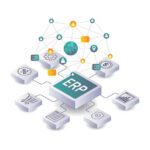
Avoid Erp Regret: Make Sure You’re Asking the Right Questions
As a business leader, you know the importance of choosing the right Enterprise Resource Planning (ERP) system. The wrong choice could lead to buyer’s remorse, wasted time, and a loss of resources. To avoid this, it’s important to ask the right questions when evaluating ERP options. Here are 10 key questions to ask yourself before making a purchase decision. This article will help you make an informed decision and ensure that your ERP system meets the needs of your business.
Total costs of ownership (TCO)
What are the total costs of ownership (TCO) with the ERP cloud solution? TCO includes the initial cost of the software, any setup or customization fees, as well as any additional fees for maintenance, support, and upgrades. Be sure to ask if there are any hidden costs and be sure to include both the upfront and ongoing costs.
The power of AI and machine learning comes from their ability to process large amounts of data quickly and accurately. This makes them ideal for use in ERP systems, as they can be used to automate and optimize various business processes.
Data Security
What type of data security and compliance does the ERP cloud solution provide? Security and compliance are critical components of any cloudbased solution, so be sure to ask about the specific security measures in place. Ask about the encryption of data, the authentication methods used, and any other security protocols that are in place
HImplementation Timeline
How long does it take to implement the ERP cloud solution? Implementation times can vary greatly, depending on the complexity of the business, 3rd party integrations etc. Ask the provider for an estimated timeline for the implementation process and make sure they are realistic.
Support
What is the provider’s support and maintenance policy? Make sure the provider offers timely and reliable customer support and maintenance. Ask about the average turnaround time for support requests, as well as any additional fees for support and maintenance.
Customization Capabilities
Does the solution offer customization and integration capabilities? Depending on your needs, you may require some level of customization or integration with other systems. Ask the provider about their capabilities in this area and the associated costs.
Scalability
How will the ERP cloud solution scale as our business grows? Make sure the provider can provide the necessary scalability to accommodate your business’s growth. Ask about the provider’s scalability capabilities and any associated costs.
Updates and New Releases
How often are updates and new features added to the ERP cloud solution? Ask the provider about their update schedule, as well as any associated costs. Be sure to ask if the provider offers a trial period or other way to test new features before committing to them.
Backup and Disaster Recovery
Is there a backup and disaster recovery plan in place? Make sure the provider has a comprehensive backup and disaster recovery plan in place. Ask about their backup frequency, the recovery time objectives, and any additional fees for disaster recovery
Integration Capabilities
How will the ERP cloud solution integrate with our existing systems? Make sure the provider can provide the necessary level of integration with your existing systems. Ask about their capabilities and any associated costs.
Data Migration
Does the provider offer any migration services to transition from our current system to the ERP cloud solution? If you are transitioning from an on-premise system to the cloud, make sure the provider offers the necessary migration services. Ask about the provider’s experience with migrating from other systems, as well as any associated costs




